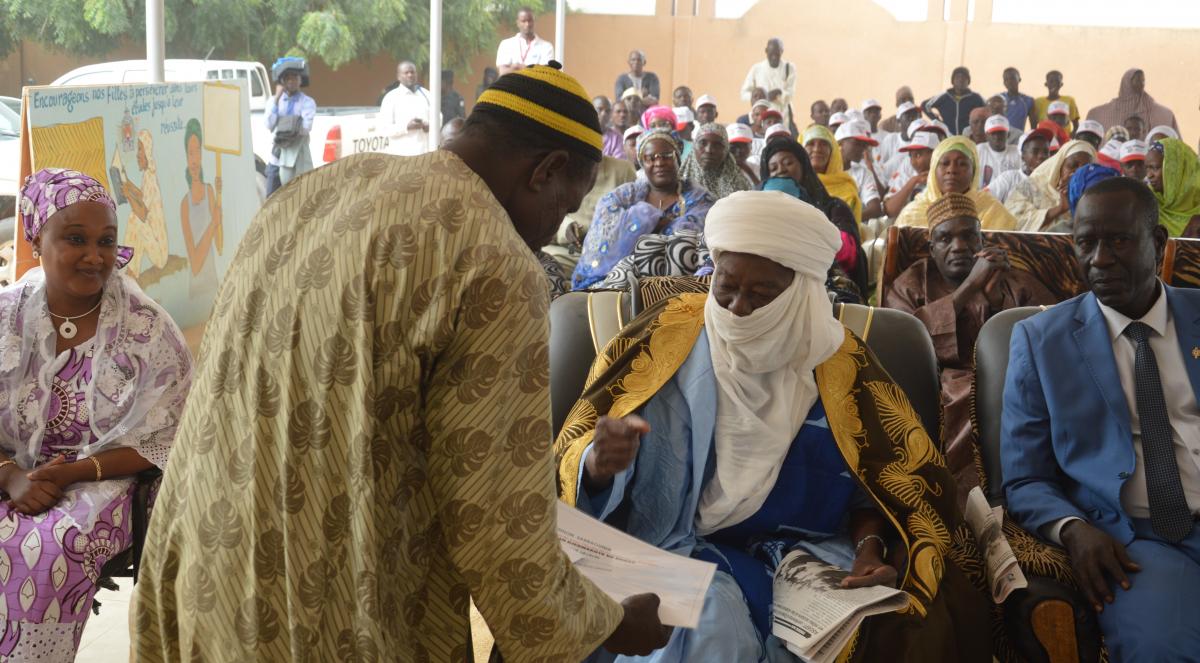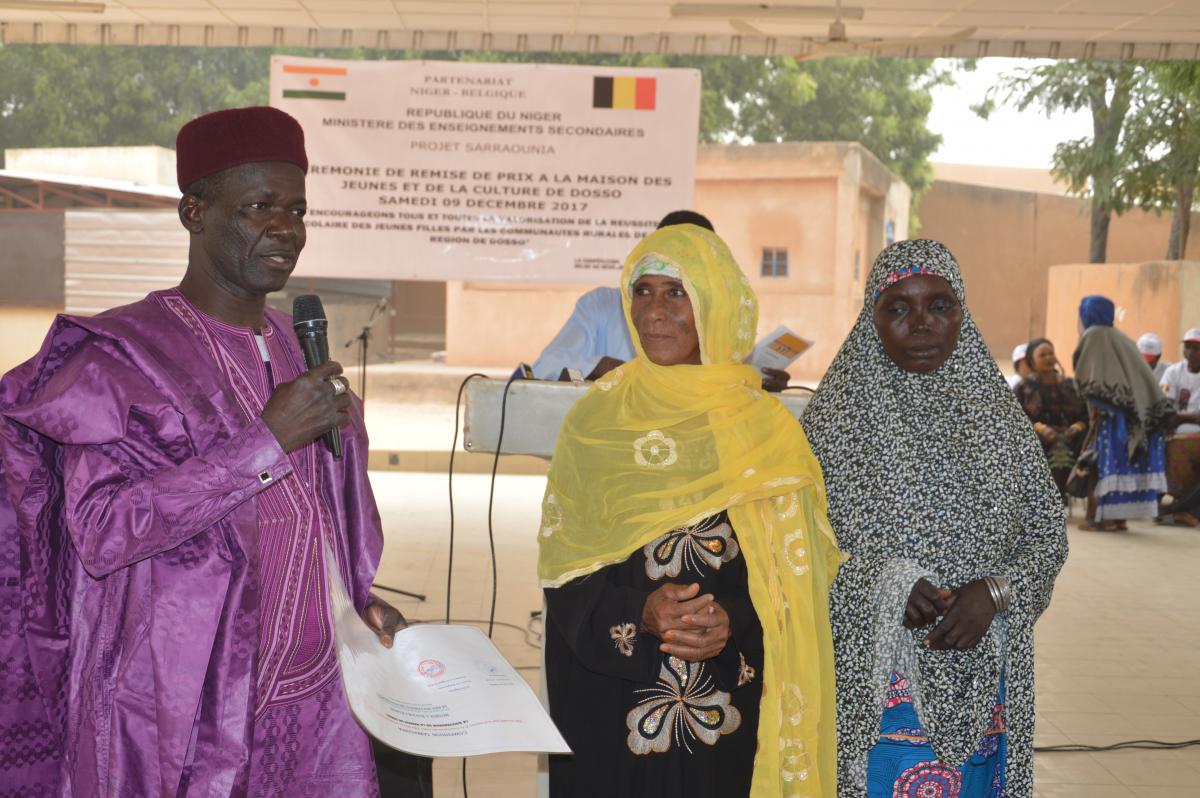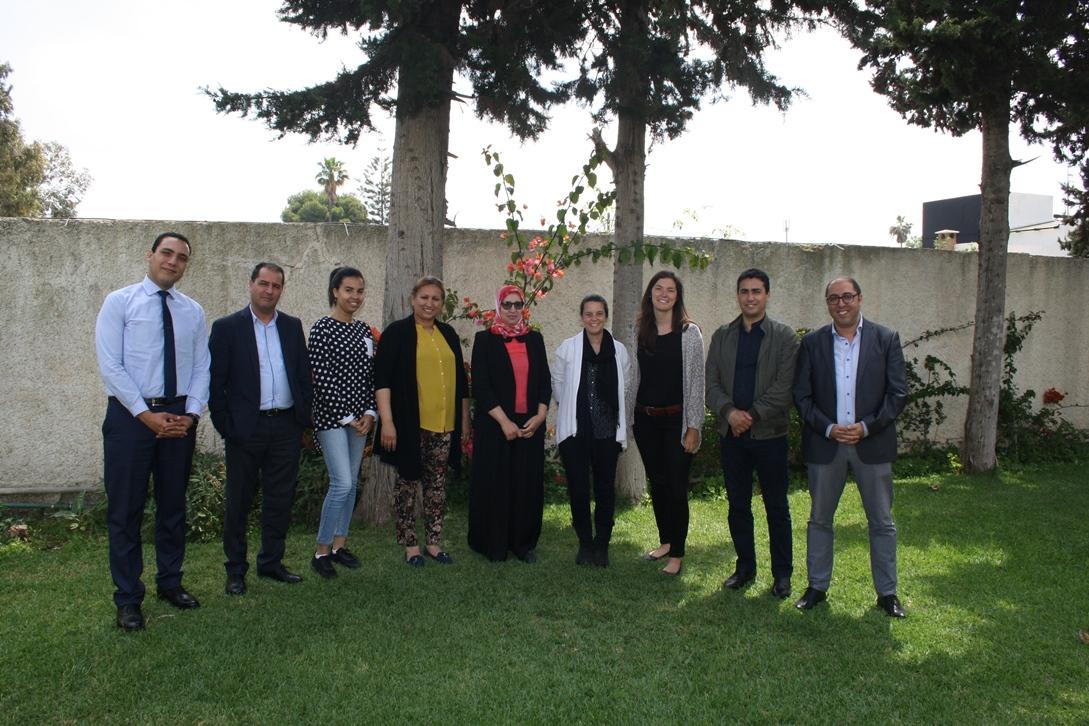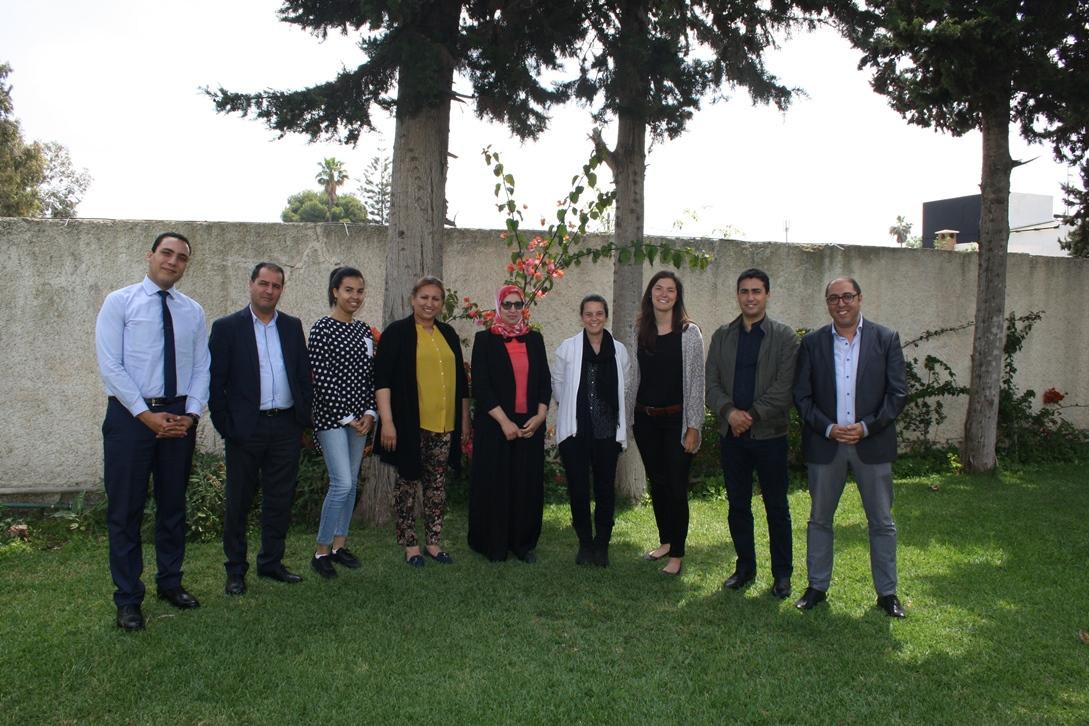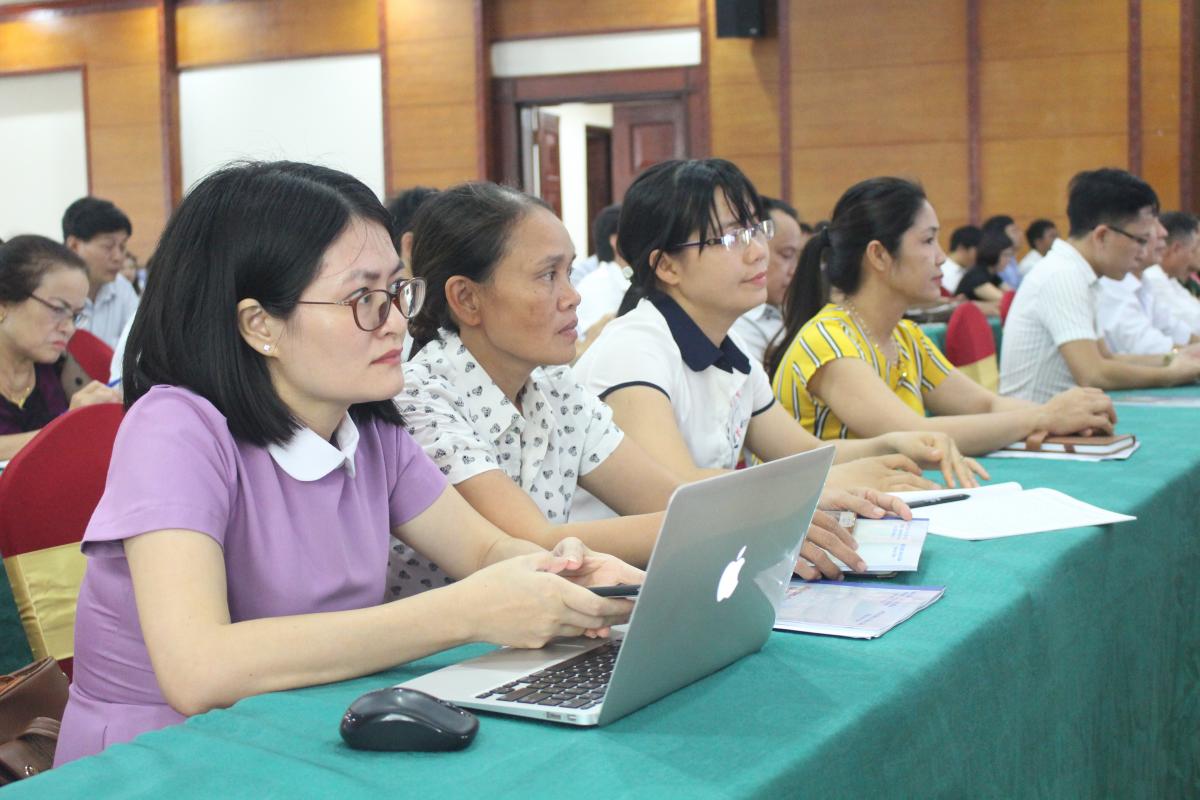Rechercher
Affichage de 2565 à 2580 sur 3122 actualités
-
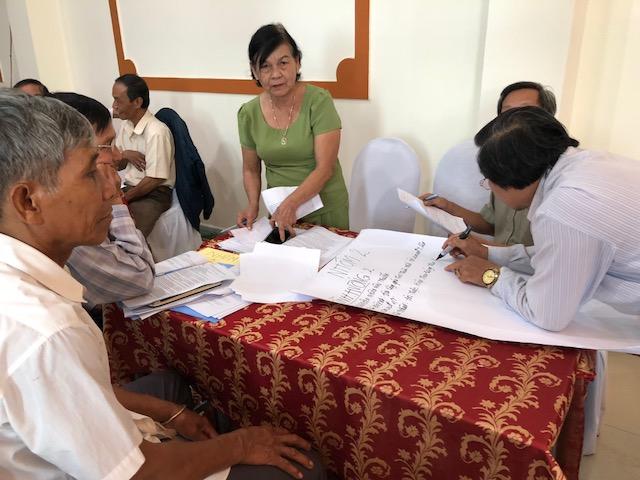
Conciliators make communities strong and resilient
Marion FISCHER | 29/05/2018
In 4 training courses in May 2018, 141 conciliators from around 75 communes in Kon Tum province acquired knowledge of the rules of engagement, new skills and methods for the settlement of conflicts that are below the threshold of prosecution. Vietnamese laws and village conventions are the basis for their work. Understanding the reasons and motivations of people to get into conflicts is key to developing empathy with the people’s case. The trained conciliators aptly help the people to overcome the causes of their dispute, find a compromise or prepare for settlement in court.
-
Un leader engagé en faveur de la scolarisation de la jeune fille dans sa communauté
Céline MEWISSEN | 28/05/2018
L’Imam Abarchi, leader religieux, prêche lors de la prière hebdomadaire du vendredi depuis environ cinq ans. C’est un pionnier dans son village de Birni Falla dans la commune de Douméga à Dosso (Niger). Il a en effet posé un acte, inimaginable il y a à peine un an dans cette communauté rurale traditionnelle : remettre la dot apportée par le prétendant de sa fille Aicha en classe de 3ième, admise au BEPC session 2017 afin de lui permettre de poursuivre ses études au Lycée de Douméga. Le mariage précoce était jusqu’alors la pratique la plus valorisée socialement pour toute jeune fille scolarisée. Pourtant, son geste a été relativement bien compris par son entourage car, selon lui, « à Birni Falla, les villageois ont vu des exemples concrets de l'impact de la réussite scolaire d'une jeune fille pour la jeune fille elle-même, sa famille et sa communauté ». Il estime que les normes et les pratiques sociales relatives au mariage précoce évoluent. Grâce à une approche de sensibilisation relationnelle, « la majorité des parents d'élèves privilégient désormais la réussite scolaire de leurs filles sur la pratique traditionnelle du mariage précoce ». Auparavant dès qu'une jeune fille était exclue du système public après les deux tentatives permises au BEPC, elle était systématiquement mariée. Maintenant, ce sont les parents eux-mêmes qui se débrouillent pour lui permettre de s'inscrire dans un collège privé à Douméga afin de lui donner une nouvelle chance d'obtenir ce diplôme d'études secondaires, indispensable pour avoir accès à des formations diplômantes. Pour démontrer son engagement sans faille, l’Imam Abarchi s'est dit disponible pour être un ambassadeur du plaidoyer en faveur de la scolarisation de la jeune fille dans les communautés rurales où les individus continuent de privilégier le mariage précoce. Dans ce cadre, il a déjà été primé en tant que leader religieux le plus engagé en faveur de la scolarisation de la jeune fille dans sa communauté par l'Honorable Sultan Djermakoye, la plus haute autorité traditionnelle de la région lors d’une cérémonie. Des personnes comme l’Imam Abarchi qui osent défier les stéréotypes culturels sont incontestablement des modèles locaux à promouvoir socialement.
-
Compétition Sarraounia : la valorisation sociale de modèles locaux engagés
Céline MEWISSEN | 28/05/2018
Dans le cadre du projet Sarraounia, la première édition de la Compétition Sarraounia a été organisée afin de récompenser les meilleur(e)s élèves de l’année, mais pas seulement. En effet, l’originalité de cette compétition réside dans son caractère inclusif : plusieurs catégories de prix ont été décernées afin de récompenser l'engagement individuel et communautaire des acteurs locaux en faveur de la scolarisation de la jeune fille. En premier lieu, c’est l'engagement de la jeune fille et la promotion du modèle de la jeune fille qui réussit ses études qui ont été mis en avant. En récompensant des modèles de jeunes filles qui réussissent leurs études, le projet vise à emmener progressivement la majorité des individus dans les communautés rurales cibles à percevoir la réussite scolaire comme une meilleure opportunité pour la jeune fille scolarisée que le mariage précoce. Ensuite, l'engagement des structures scolaires et des leaders locaux a été mis à l’honneur à travers l’attribution de prix aux acteurs locaux les plus engagés. Ont notamment été ciblés : les Comités de Gestion des Etablissements Scolaires les plus dynamiques et un leader religieux particulièrement engagé. Enfin, l'engagement des parents d'élèves et la promotion du modèle de parents d'élèves qui encouragent la réussite scolaire de la jeune fille individuellement au niveau des familles a été récompensé. En récompensant individuellement les parents d'élèves qui encouragent le plus leurs filles scolarisées jusqu'à l'obtention de leur BEPC, Sarraounia a adopté une approche innovante.
-

Why a VET Toolbox ?
Thibaut MONNIER | 28/05/2018
Employment is the key to development and inclusive growth. It generally leads to improved living conditions and reduces poverty. A main driver of employment is education, and particularly vocational education and training (VET), which equips people with skills that are on demand in the labour market. However, many of the VET systems in the developing world are inadequate. People trained through these existing VET systems do not acquire the right skills and competences due to several limiting factors, namely the lack of private sector involvement in the training and missing linkages to formal and informal businesses. Furthermore, the VET systems are often inaccessible to the most disadvantaged groups, including vulnerable individuals, youth and women, even though it is exactly these people that could benefit most from an education that increases employability.Addressing these challenges requires clear priorities and particularly resources, which many countries do not have or are not capable of mobilising. As a response, the European Union decided to launch the VET Toolbox, a new international facility that provides partner countries with much needed expertise, tools on themes such as VET policy and reform, labour market intelligence, private sector engagement in VET, and inclusiveness of disadvantaged groups.
-

VOUCHER SCHEME
William YEKA | 25/05/2018
To improve the quality of skills training of livelihood activities, Enabel has set up a voucher scheme, breaking down skills development to its smallest possible format through ‘instant skills training’ to beneficiaries of agencies supporting livelihood and income generating activities.
-
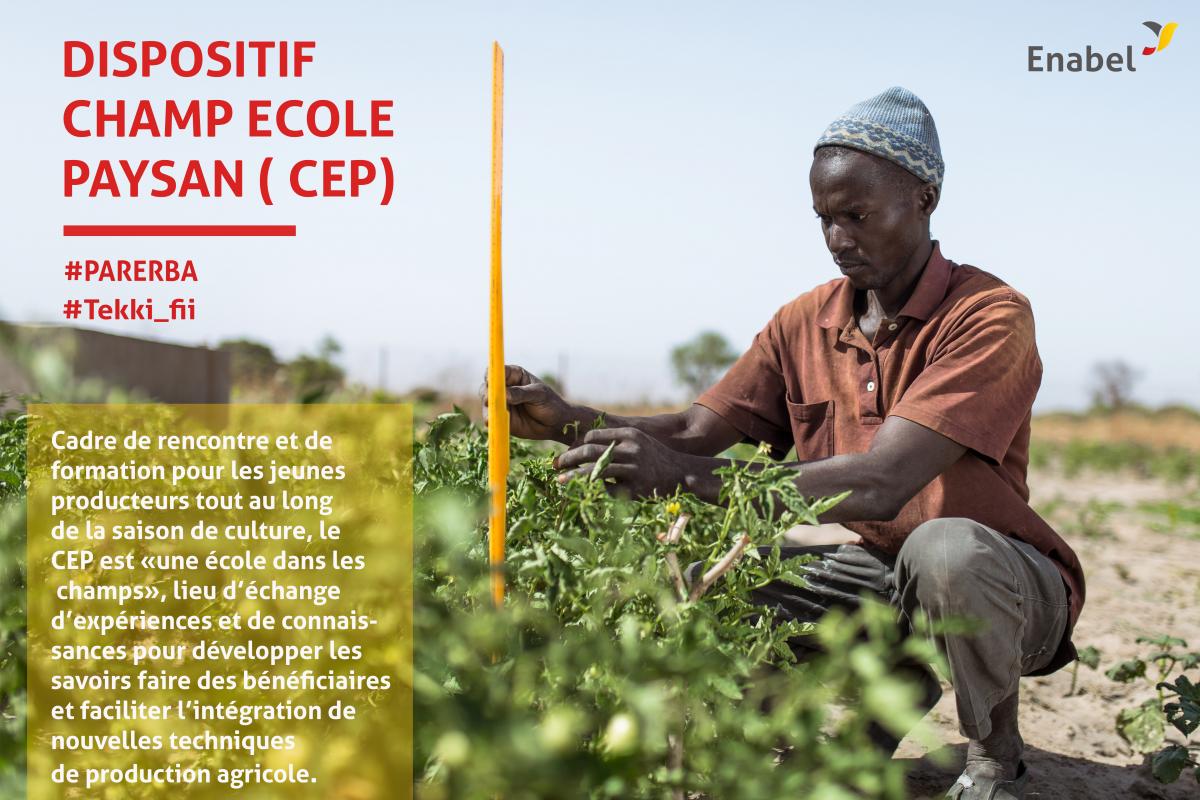
Le dispositif Champ Ecole Paysan du Parerba
Aïda SECK | 23/05/2018
Cadre de rencontre et de formation pour les jeunes producteurs tout au long de la saison de culture, le CEP est « une école dans les champs », lieu d’échange d’expériences et de connaissances pour développer les savoirs faire des bénéficiaires et faciliter l’intégration de nouvelles techniques de production agricole.
-
Le Programme d’appui à la gestion de la thématique migratoire est lancé !
Roxane VANLERBERGE | 22/05/2018
Entre avril et mai, Enabel au Maroc a accueilli huit nouveaux collaborateurs au sein de son Programme d’appui à la gestion de la thématique migratoire, mis en œuvre en partenariat avec le Ministère délégué chargé des Marocains Résidant à l’Étranger et des Affaires de la Migration. Le premier volet du nouveau programme de coopération entre la Belgique et le Maroc a été officiellement signé le 15 mars et lancera ses premières activités en 2018. Composé actuellement de deux interventions, il s’aligne sur les politiques marocaines en matière de migration.Première composante du nouveau programme, le projet Amuddu appuie le volet « formation professionnelle et emploi » de la Stratégie Nationale d’Immigration et d’Asile (SNIA) et contribuera à améliorer l’employabilité des migrant·e·s. Il mettra en œuvre des mesures innovantes ciblant directement les obstacles rencontrés par les migrant·e·s dans leur parcours d’intégration économique (appui à l’auto-emploi, bourses, incitations à l’embauche, mentoring…). Par le développement de dynamiques au niveau local, le projet identifiera par ailleurs les besoins et les attentes de la population migrante. Cela facilitera l’orientation de cette population vers les services adéquats, en particulier ceux de l’Entraide Nationale et l’Agence nationale de promotion de l'emploi et des compétences, institutions avec lesquelles le projet Amuddu a établi des partenariats opérationnels. Le projet MBI (Maghrib Belgium Impulse) accompagnera quant à lui les Marocain·e·s résidant en Belgique et porteurs/euses d’un projet d’investissement dans la création de leur entreprise au Maroc. Les porteurs/euses de projet sélectionné·e·s recevront un appui personnalisé comprenant de nombreuses formations ainsi que du coaching par des professionnel·le·s de l’entreprenariat. Grâce au partenariat établi avec la Confédération Générale des Entreprises du Maroc, elles/ils bénéficieront également de nombreuses opportunités de networking avec d’autres expert·e·s actif/ves au Maroc. L’équipe du Programme migration s’agrandira encore prochainement avec l’intégration d’une troisième intervention portant sur l’empowerment juridique des migrant·e·s. Ce projet aura pour but d’améliorer l’accès des migrant·e·s et réfugié·e·s à leurs droits via le renforcement des compétences des acteurs/trices pouvant faciliter cet accès (avocat·e·s, étudiant·e·s en droit, associations et personnel des institutions publiques). Le lancement de ce programme illustre l’élargissement du champ d’activités de la coopération belge au Maroc à de nouvelles thématiques, en particulier dans le domaine des droits humains. Avec trois interventions ciblant la question migratoire, la Belgique soutient activement le Maroc dans la mise en œuvre de ses politiques migratoires en alliant un partage de son expérience en tant que pays d’immigration à une mobilisation des compétences des Marocain·e·s résidant en Belgique.
-
Le Programme d’appui à la gestion de la thématique migratoire est lancé !
Roxane VANLERBERGE | 22/05/2018
Entre avril et mai, Enabel au Maroc a accueilli huit nouveaux collaborateurs au sein de son Programme d’appui à la gestion de la thématique migratoire, mis en œuvre en partenariat avec le Ministère délégué chargé des Marocains Résidant à l’Étranger et des Affaires de la Migration. Le premier volet du nouveau programme de coopération entre la Belgique et le Maroc a été officiellement signé le 15 mars et lancera ses premières activités en 2018. Composé actuellement de deux interventions, il s’aligne sur les politiques marocaines en matière de migration. Première composante du nouveau programme, le projet Amuddu appuie le volet « formation professionnelle et emploi » de la Stratégie Nationale d’Immigration et d’Asile (SNIA) et contribuera à améliorer l’employabilité des migrant·e·s. Il mettra en œuvre des mesures innovantes ciblant directement les obstacles rencontrés par les migrant·e·s dans leur parcours d’intégration économique (appui à l’auto-emploi, bourses, incitations à l’embauche, mentoring…). Par le développement de dynamiques au niveau local, le projet identifiera par ailleurs les besoins et les attentes de la population migrante. Cela facilitera l’orientation de cette population vers les services adéquats, en particulier ceux de l’Entraide Nationale et l’Agence nationale de promotion de l'emploi et des compétences, institutions avec lesquelles le projet Amuddu a établi des partenariats opérationnels. Le projet MBI (Maghrib Belgium Impulse) accompagnera quant à lui les Marocain·e·s résidant en Belgique et porteurs/euses d’un projet d’investissement dans la création de leur entreprise au Maroc. Les porteurs/euses de projet sélectionné·e·s recevront un appui personnalisé comprenant de nombreuses formations ainsi que du coaching par des professionnel·le·s de l’entreprenariat. Grâce au partenariat établi avec la Confédération Générale des Entreprises du Maroc, elles/ils bénéficieront également de nombreuses opportunités de networking avec d’autres expert·e·s actif/ves au Maroc. L’équipe du Programme migration s’agrandira encore prochainement avec l’intégration d’une troisième intervention portant sur l’empowerment juridique des migrant·e·s. Ce projet aura pour but d’améliorer l’accès des migrant·e·s et réfugié·e·s à leurs droits via le renforcement des compétences des acteurs/trices pouvant faciliter cet accès (avocat·e·s, étudiant·e·s en droit, associations et personnel des institutions publiques). Le lancement de ce programme illustre l’élargissement du champ d’activités de la coopération belge au Maroc à de nouvelles thématiques, en particulier dans le domaine des droits humains. Avec trois interventions ciblant la question migratoire, la Belgique soutient activement le Maroc dans la mise en œuvre de ses politiques migratoires en alliant un partage de son expérience en tant que pays d’immigration à une mobilisation des compétences des Marocain·e·s résidant en Belgique.
-
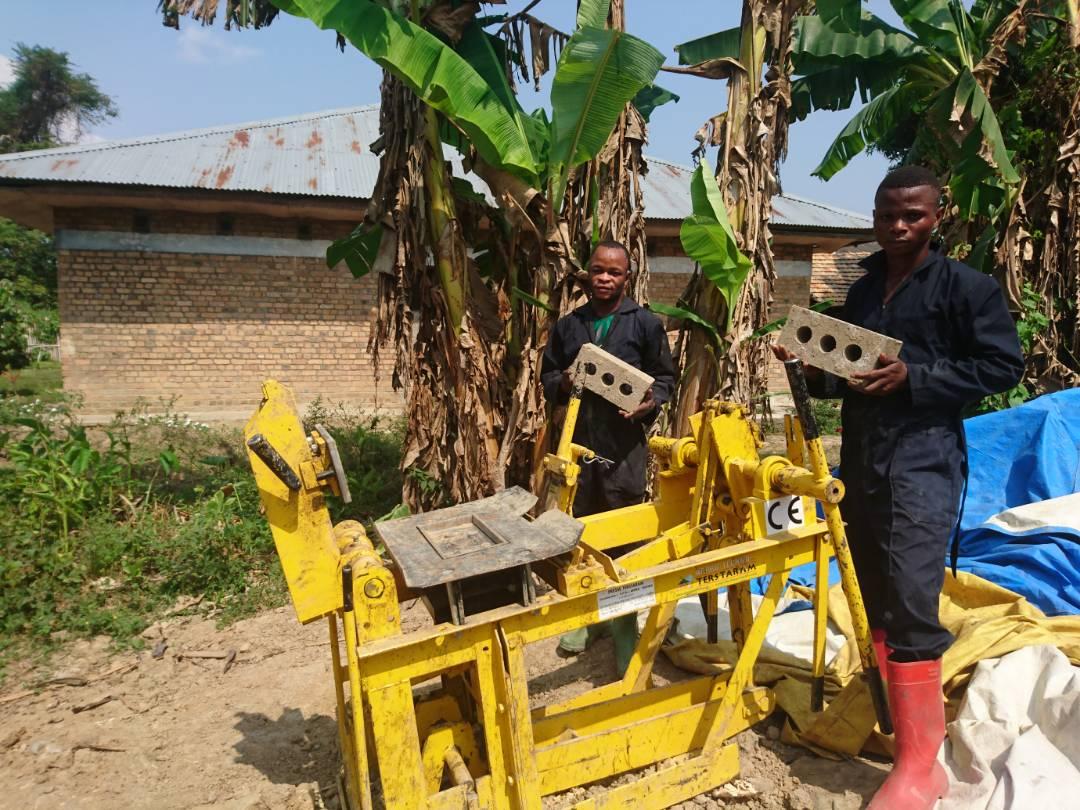
La Formation des briquetiers : Un appui pour l’insertion socio-professionnelle des jeunes
Michael MALEMBA | 18/05/2018
En partenariat avec le monde associatif et en vue de l’apprentissage de métiers porteurs en termes d’insertion professionnelle des jeunes, deux experts briquetiers ont été dépêchés de GBADOLITE, en appui à la congrégation des frères Franciscains de la vie de Marie. Ces artisans ont formé 6 frères encadreurs et 25 jeunes déscolarisés aux techniques de fabrication des briques cuites dans la cité d’UMANGI, située à 17 km au nord de la ville de LISALA au bord du fleuve Congo. La formation s’est déroulée en deux étapes : d’abord le bon choix de l’argile afin de produire une brique de qualité, le broyage, le malaxage, le façonnage ainsi que le séchage ; ensuite la mise en place d’un four adapté à la cuisson des briques. Cette formation est en adéquation avec les besoins des apprenants, dans la mesure où elle ouvre la voie à ces derniers vers une insertion professionnelle. L’accès à un emploi durable et de qualité devrait leur permettre de s’émanciper professionnellement et socialement tout en restaurant des logiques d’acteurs et de responsabilité.Le programme a doté cette structure de presses à briques modernes pour poursuivre la formation des apprenants devenus des acteurs de changement (formation et éveil entrepreneurial). De plus, des presses à briques fabriquées localement par les forgerons, ont été remises comme kits de sortie à la première promotion des jeunes formés pour leur insertion socio-professionnelle. Ceci afin de contribuer à l’amélioration des conditions de vie des jeunes, grâce à la promotion d’activités génératrices de revenus.Signalons par ailleurs, que le programme vient en appui aux forgerons en vue de renforcer le secteur privé tout en disponibilisant une main d’œuvre qui correspond à leurs attentes en capital humain de qualité. Equipe EDU-MOSU
-
Understanding the constituencies is key to success of councillors
Marion FISCHER | 17/05/2018
Two training courses started in Ha Tinh city on 16 May 2018. The first course with over 100 members of People's Councils of provincial and district level enhanced the skills of the deputies in direct contact with and qualified response to the people's complaints and proposals. In a second training course the methodic information will be mainstreamed to the councillors on commune and ward levels. The trainer for the first course is Ph.D. Nguyen Si Dung, the Former Vice Chairman of the Office of the National Assembly, and the trainer for the second course is Ph.D. Bùi Đức Thụ, the former Standing Member of Finance and Budget Committee of the National Assembly in the 2011-2016 Tenure.
-
CDPR: governance made easy, follow the link
Erwin DICKENS | 10/05/2018
With this brochure CDPR tries to explain in simple language waht the projct has doen. Often the general public asks itself: what is the point of Governance projects? Apart from meetings, trainings and a whole lot of documents, how does it make a difference? We really hope that this brochure helps to understand better the importance of governance. Any suggestions to improve are most welcome! Follow the link!!https://drive.google.com/file/d/1OliTEnoj8WXFwxPsqxTspxSHWKPMTsZu/viewhttps://drive.google.com/file/d/1nXt8QEoX1LmD6o6cVSVrNsMHfWSo9Aey/view
-
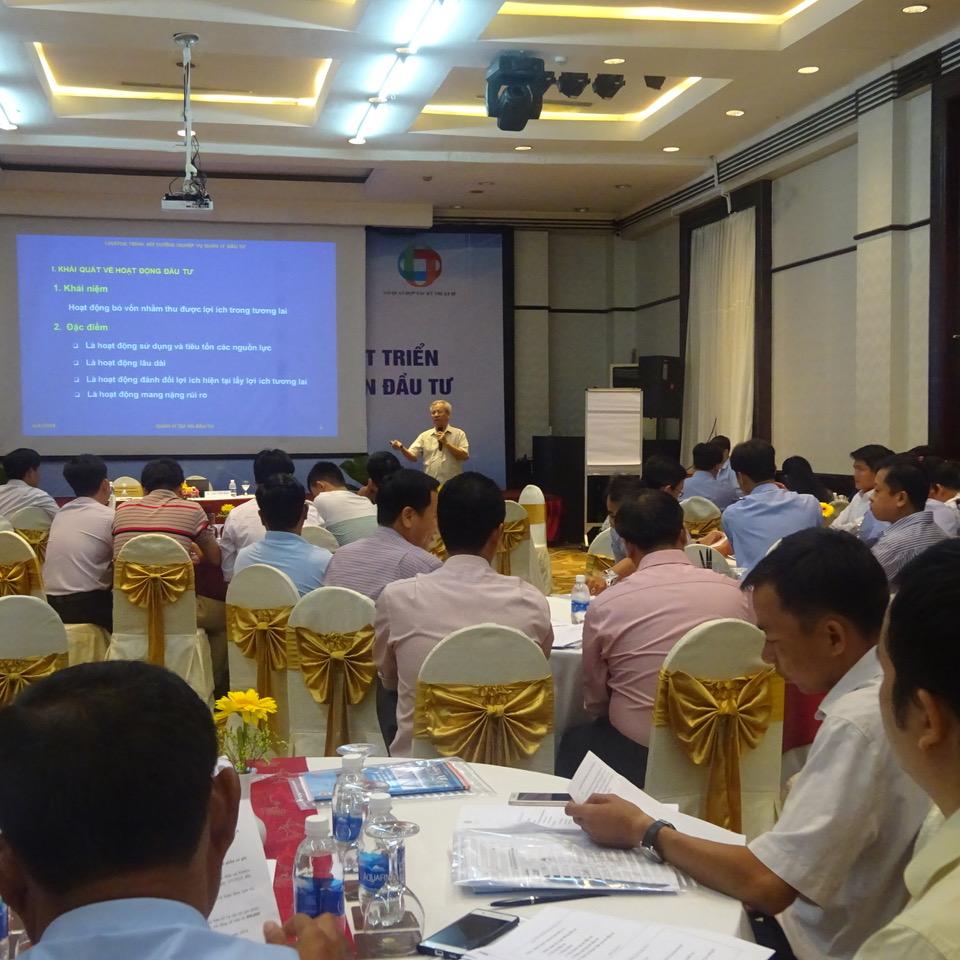
CDPR: the final actions
Erwin DICKENS | 09/05/2018
With the technical and financial support from Belgian Development Agency (Enabel) and in line with End Term Evaluation recommendations, in April and May 2018 the Capacity Development for Planning Reform (CDPR) project organized in cooperation with the MPI Training Institute five training courses in Da Nang and Ho Chi Minh city about local socio-economic development plans (SEDP) and public investment project assessment. The training courses involved participation of more than 400 trainees from various districts, communes in Central, Central Highland and Mekong Delta regions. Theoretical and practical knowledge about preparation, monitoring and evaluation of SEDPs, evaluation of public investments, followed by problem case solving, were organised in a real-life manner.”
-
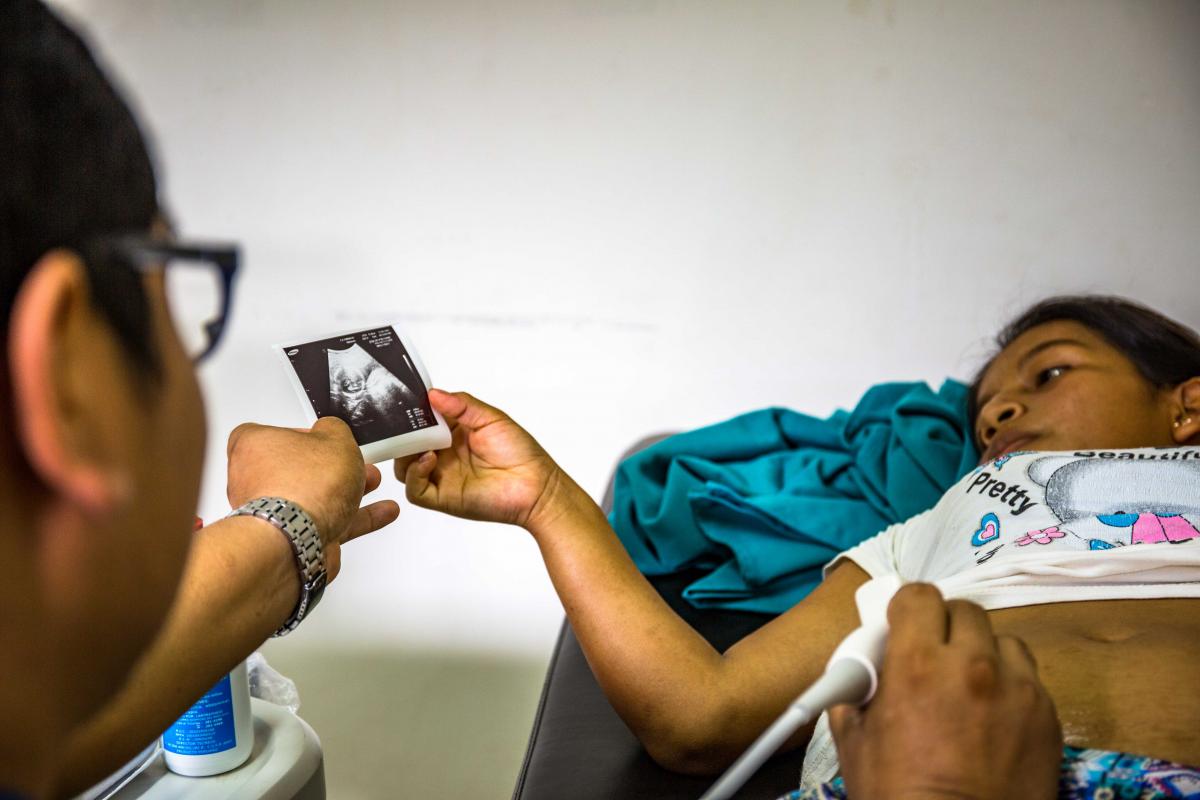
Investigación - Acción sobre la asignación de recursos en Unidades Ejecutoras de Salud
Véronique GERARD | 08/05/2018
En el Perú, el Ministerio de Economía y Finanzas (MEF) implementó, en 2007, el Presupuesto por Resultados (PpR) como una estrategia para modernizar la manera tradicional de formular el presupuesto público. A diferencia de esta, que se basa en la asignación histórica (incrementalismo), el PpR busca el cumplimiento de resultados, medidos con indicadores previamente definidos. Siguiendo esta lógica, el Programa Presupuestario de Salud Materno Neonatal (PPSMN), cuyo resultado final es la reducción de la morbimortalidad materna y neonatal, fue uno de los primeros que se implementó en 2008. En 2014, el MEF, el Seguro Integral de Salud-SIS y los Gobiernos Regionales de Amazonas y Cajamarca firmaron un convenio cuyo objetivo era incrementar la cobertura del Programa de salud materno neonatal. Para ello, contó con recursos de la Cooperación Belga a través de la Agencia Belga de Desarrollo (CTB-Perú - Enabel).Estas regiones fueron priorizadas por tener gran población vulnerable y altas tasas de morbi-mortalidad materna y neonatal. Para reducir los cuellos de botella a nivel local y mejorar la provisión de servicios de calidad, se diseñó una Investigación Acción de los procesos decisionales de la asignación de recursos y su monitoreo y control. La investigación describe el funcionamiento de Unidades Ejecutoras en salud, analiza sus desafíos y cuellos de botellas. También, se describe como las Unidades Ejecutoras han pasado por el ejercicio de priorización y ejecución de sus gastos a través de un ciclo de mejora. Por fin también recomienda acciones para facilitar una investigación acción en base a esta experiencia. Encuentren a continuación el informe de esta investigación: https://drive.google.com/drive/u/1/folders/1KZ4pL_bj3wEE-d2nDngJlYL7wvyzhDCk
-

Enabel au Salon International de l'Agriculture au Maroc
Meriem HILALI | 08/05/2018
Pour la 8ème fois consécutive, l’Agence belge de développement a participé activement au Salon international de l’agriculture (SIAM) de Meknès. Cette année, pour la première fois, Enabel y assurait une triple présence. Dans le pôle « international », tous les projets d’appui à l’agriculture solidaire maroco-belges étaient présents dans un stand où les animatrices du projet d’appui aux filières du safran et du palmier dattier ont pu montrer les résultats impressionnants des cours d’alphabétisation fonctionnelle des femmes rurales. Pour la première fois cette année, dans le pôle « produits », l’équipe du même projet animait un stand « BtoB » pour promouvoir les produits des coopératives partenaires auprès de gros acheteurs potentiels. Enfin, dans le pôle « produits du terroir », les coopératives et groupements d’intérêt économique partenaires des filières safran, dattes et amandes exposaient et vendaient leurs produits au public, en présence des équipes d’animateurs des projets qui les ont accompagnés jusque-là. Saluons la coopérative d’amandes de Sidi Bouhria (région de l’Oriental) qui a eu l’honneur d’obtenir la médaille de bronze dans la catégorie de fruits et légumes du Concours marocain des produits du terroir.
-

Enabel au Salon international de l'Agriculture
Meriem HILALI | 08/05/2018
Pour la 8ème fois consécutive, l’Agence belge de développement a participé activement au Salon international de l’agriculture (SIAM) de Meknès. Cette année, pour la première fois, Enabel y assurait une triple présence. Dans le pôle « international », tous les projets d’appui à l’agriculture solidaire maroco-belges étaient présents dans un stand où les animatrices du projet d’appui aux filières du safran et du palmier dattier ont pu montrer les résultats impressionnants des cours d’alphabétisation fonctionnelle des femmes rurales. Pour la première fois cette année, dans le pôle « produits », l’équipe du même projet animait un stand « BtoB » pour promouvoir les produits des coopératives partenaires auprès de gros acheteurs potentiels. Enfin, dans le pôle « produits du terroir », les coopératives et groupements d’intérêt économique partenaires des filières safran, dattes et amandes exposaient et vendaient leurs produits au public, en présence des équipes d’animateurs des projets qui les ont accompagnés jusque-là. Saluons la coopérative d’amandes de Sidi Bouhria (région de l’Oriental) qui a eu l’honneur d’obtenir la médaille de bronze dans la catégorie de fruits et légumes du Concours marocain des produits du terroir.
